Sudan’s Deep State: How Insiders Violently Privatized Sudan’s Wealth, and How to Respond
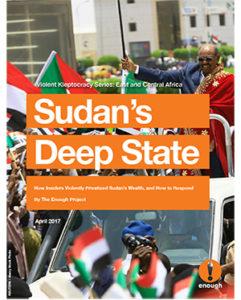
Sudan’s government is a violent kleptocracy, a system of misrule characterized by state capture and co-opted institutions, where a small ruling group maintains power indefinitely through various forms of corruption and violence. Read our latest report ...
Border Control from Hell: How the EU’s migration partnership legitimizes Sudan’s “militia state”
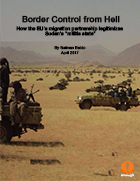
Large-scale migration to Europe has precipitated a paradigm shift in relations between the European Union (EU) and the government of Sudan, and closer ties between both entities. Read the full report ...
Enough Forum: A Way Out? Models for negotiating an exit plan for entrenched leadership in South Sudan
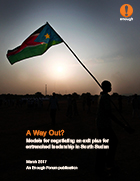
The Enough Forum is a platform for dynamic discourse engaging critical issues, challenges, and questions among thought leaders, field researchers, and policy experts. Opinions and statements herein are those of the authors and participants in the forum, and do not necessarily reflect the opinion or policy recommendations of the Enough Project ...
How The World’s Newest Country Went Awry: South Sudan’s war, famine, and potential genocide
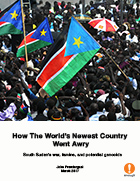
War has been hell for South Sudan’s people, but it has been very lucrative for the country’s leaders and commercial collaborators, South Sudan’s war profiteers ...
Enough Project Comment to the SEC in Support of Conflict Minerals Rule Implementation
On January 31, Acting Chairman of the Securities and Exchange Commission (SEC) Michael Piwowar welcomed interested parties to submit comments in response to a statement calling into question the current Conflict Minerals Rule. In the weeks following, numerous companies, investors, activists, NGOs, and others have come out publicly in support of the Rule. The Enough Project strongly opposes any suspension, weakening, or repeal of the current Conflict Minerals Rule, and urges the SEC to increase enforcement of the Rule. Our full comment can be found below ...
Dangerous Divisions: The Central African Republic faces the threat of secession
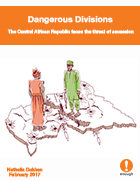
The Central African Republic (CAR), a country that has seen more than four years of deep political crisis and unprecedented violence against civilians, is undergoing a process of de facto partition. In February 2014, then-U.N. Secretary-General Ban Ki-moon warned the international community that CAR was at risk of splitting apart, stating that, “[T]he situation continues to worsen. Both Muslims and Christians have been murdered and forced to flee their homes. The sectarian brutality is changing the country’s demography. The de facto partition of the CAR is a distinct risk.” Despite his warning, CAR did not escape this fate. In 2017, ...
Weapons of Mass Corruption: How corruption in South Sudan’s military undermines the world’s newest country

“Weapons of Mass Corruption” is the fifth in a series of in-depth, field research-driven reports on the dynamics of profit and power fueling war in the Horn, East and Central Africa. Violent kleptocracies dominate the political landscape of this region, leading to protracted conflicts marked by the commission of mass atrocities by state and non-state actors. Enough's Political Economy of African Wars series will focus on the key players in these conflicts, their motivations, how they benefit from the evolving war economies, and what policies might be most effective in changing the calculations of those orchestrating the violence–including both incentives ...
Testimony of Sasha Lezhnev – Democracy and Human Rights in the Democratic Republic of the Congo
Testimony of Sasha Lezhnev, Enough Project Associate Director of Policy, given on November 29, 2016 before the U.S. Congress’ Tom Lantos Human Rights Commission hearing on “Democracy and Human Rights in the Democratic Republic of the Congo.” ...
Five Lessons from a Sanctions Practitioner
Economic sanctions, the steps a government takes to prohibit certain types of economic activities with a foreign country, company, or individual, have become a preeminent tool of U.S. foreign policy. They are used to combat threats ranging from nuclear proliferation in Iran or North Korea to civil strife and mass atrocities in Central Africa. In past decades, sanctions were typically “comprehensive,” in which the United States would ban nearly all trade and economic activity with an adversary. This approach is rarely taken anymore, with only a few countries, like Syria, Sudan, and North Korea, subject to these types of comprehensive ...
Activist Brief: “Five Lessons from a Sanctions Practitioner”
Economic sanctions, the steps a government takes to prohibit certain types of economic activities with a foreign country, company, or individual, have become a preeminent tool of U.S. foreign policy. They are used to combat threats ranging from nuclear proliferation in Iran or North Korea to civil strife and mass atrocities in Central Africa. In past decades, sanctions were typically “comprehensive,” in which the United States would ban nearly all trade and economic activity with an adversary. Today, most U.S. sanctions programs are “targeted,” in which the U.S. will freeze the assets of specific, named individuals and companies overseas and ...

